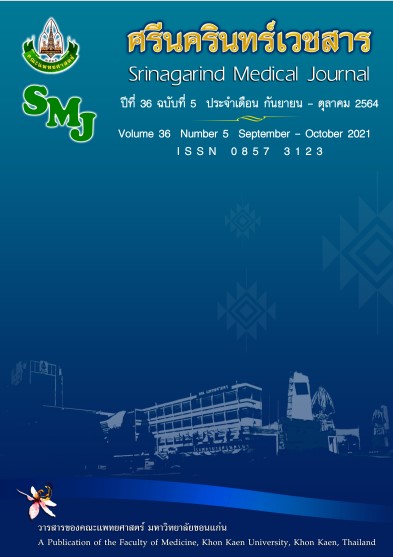Comparison of Efficacy between Short Hydration and Continuous Hydration for Prevention of Cisplatin Induced Nephrotoxicity
Keywords:
efficacy; short hydration; continuous hydration; nephrotoxicity; cisplatinAbstract
Background and Objective: Cisplatin is antineoplastic drug that has been used in the treatment of several type of solid tumor and hematologic malignancies. Nephrotoxicity is one of the major and most serious toxicities caused by cisplatin. Hydration is used very commonly and while effective but several strategies able to prevent nephrotoxicity. This study was to comparison efficacy of short and continuous hydration for prevention of cisplatin induced nephrotoxicity (CIN).
Methods: The retrospective study collected data from medical records and electronic databases between 1 January 2011 and 31 December 2018. Inclusion criteria was solid tumors type of patients with age ≥ 20 years old received single cisplatin or combination regimen as inpatients setting, divided into 2 groups, short hydration group (1 L 0.9%NaCl intravenous rate ≥ 500 ml/hr) and continuous hydration group (1 L 0.9%NaCl intravenous rate < 200 ml/hr) for prevention of CIN and performance status (ECOG) 0-2. No data for evaluation of efficacy and serum creatinine > 1.5 mg/dl prior treatment were excluded. Primary outcome was the incidence of CIN ≥ grade 3 after received cisplatin at any cycles. Grading of nephrotoxicity classified by common terminology criteria for adverse events (CTCAE) 5.0.
Results: A total of 81 patients were enrolled. Forty eight patients in short hydration group; median cisplatin dose was 69.33±16.03 mg/m2. Thirtythree patients in the continuous hydration group; median cisplatin dose was 73.39±14.72 mg/m2. No incidence of CIN ≥ grade 3 at any cycles reported after received cisplatin. The different of incidence of CIN at any cycles any grade between short hydration group and continuous hydration group did not reach statistical significance [15 patients (31.2%) vs 16 patients (48.5); p=0.12]. The incidence of CIN at cycle 1 any grade different between 2 groups did not reach statistical significance [6 patients (12.5%) in short hydration group and 4 patients (12.1%) in continuous hydration group; p=0.95].
Conclusion: This study showed benefit of short and continuous hydration group were similar for prevention of cisplatin induced nephrotoxicity.
References
2. Pabla N, Dong Z. Cisplatin nephrotoxicity: Mechanisms and renoprotective strategies. Kidney Int 2008; 73(9): 994-1007.
3. Yamamoto Y, Watanabe K, Matsushita H, Tsukiyama I, Matsuura K, Wakatsuki A. Multivariate analysis of risk factors for cisplatin-induced nephrotoxicity in gynecological cancer. J Obstet Gynaecol Res 2017; 43(12): 1880-1886.
4. Hayati F, Hossainzadeh M, Shayanpour S, Abedi-Gheshlaghi Z, Beladi Mousavi SS. Prevention of cisplatin nephrotoxicity. J Nephropharmacol 2015; 5(1): 57-60.
5. Kobayashi R, Suzuki A, Matsuura K, Yamada N, Nakano M, Deguchi T, et al. Risk analysis for cisplatin-induced nephrotoxicity during first cycle of chemotherapy. Int J Clin Exp Med 2016; 9: 3635-3641.
6. Kidera Y, Kawakami H, Sakiyama T, Okamoto K, Tanaka K, Takeda M, et al. Risk factors for cisplatin-induced nephrotoxicity and potential of magnesium supplementation for renal protection. PloS One 2014; 9(7): e101902.
7. Crona DJ, Faso A, Nishijima TF, Mcgraw KA, Galsky MD, Milowsky MI. A systematic review of Strategies to prevent cisplatin-induced nephrotoxicity. Oncologist 2017; 22(5): 609-619.
8. Ashrafi F, Ebrahimi Z, Nematbakhsh M. Effect of short hydration on cisplatin-induced nephrotoxicity in cancer patients: A retrospective study. Int J Hematol Oncol Stem Cell Res 2017; 11(4): 262-267.
9. Ouchi A, Asano M, Aono K, Watanabe T, Kato T. Comparison of short and continuous hydration regimen in chemotherapy containing intermediate – to high – dose cisplatin. J Oncol 2014; 2014: 767652.
10. Willox JC, McAllister EJ, Sangster G, Kaye SB. Effects of magnesium supplementation in testicular cancer patients receiving cisplatin: a randomised trial. Br J Cancer. 1986; 54(1): 19-23.
11. Yamamoto Y, Tsukiyama I, Matsuura K, Watanabe K, Yabushita H, Wakatsuki A. Hydration with 15 meq magnesium is effective at reducing the risk for cisplatin-induced nephrotoxicity in patients receiving cisplatin (50 mg/m2) combination chemotherapy. Anticancer Res 2016; 36(4): 1873-1877.
12. Al-Sarraf M, Fletcher W, Oishi N, Pugh R, Hewlett JS, Balducci L, et al. Cisplatin hydration with and without mannitol diuresis in refractory disseminated malignant melanoma: A southwest oncology group study. Cancer Treat Rep 1982; 66: 31–35.
13. Santoso JT, Lucci JA 3rd, Coleman RL, Schafer I, Hannigan EV. Saline, mannitol, and furosemide hydration in acute cisplatin nephrotoxicity: A randomized trial. Cancer Chemother Pharmacol 2003; 52(1): 13-18.
14. National cancer institute; Division of cancer treatment and diagnosis. [Internet]. Maryland. Common Terminology Criteria for Adverse Events (CTCAE) Version 5.0 November 27,2017; [cited Jan 19,2019]. Available from: https://ctep.cancer.gov/protocolDevelopment/ electronic_applications/docs/CTCAE_v5_ Quick_Reference_5x7.pdf.
15. Launay-Vacher V, Rey JB, Isnard-Bagnis C, Deray G, Daouphars M; European Society of Clinical Pharmacy Special Interest Group on Cancer Care. Prevention of cisplatin nephrotoxicity: state of the art and recommendations from the European Society of Clinical Pharmacy Special Interest Group on Cancer Care. Cancer Chemother Pharmacol 2008; 61(6): 903-909.
16. Horinouchi H, Kubota K, Itani H, Taniyama TK, Nakamichi S, Wakui H, et al. Short hydration in chemotherapy containing cisplatin (≥75 mg/m2) for patients with lung cancer: a prospective study. Jpn J Clin Oncol 2013; 43(11): 1105-1109.
17. Danwilai K, Lohitnavy O, Sakunrag I, Dilokthornsakul P. The effect of magnesium supplementation on cisplatin induced nephrotoxicity: A systematic review and meta-analysis. Pharm Sci Asia 2021; 48(1): 25-36.
18. Saito Y, Kobayashi M, Yamada T, Kasashi K, Honma R, Takeuchi S, et al. Premedication with intravenous magnesium has a protective effect against cisplatin-induced nephrotoxicity. Support Care Cancer 2017; 25(2): 481-487.




